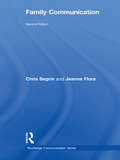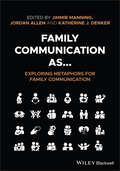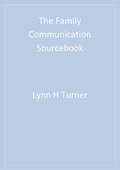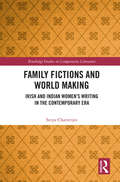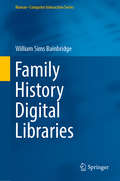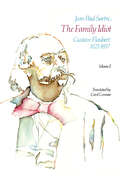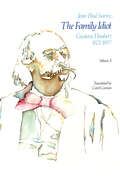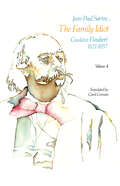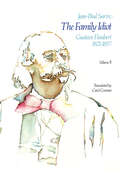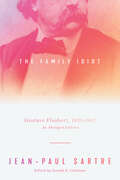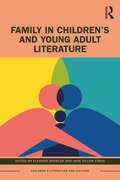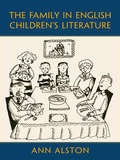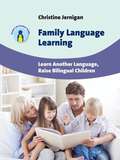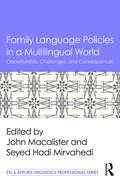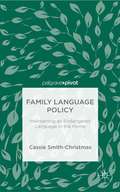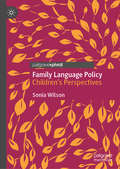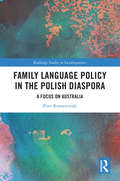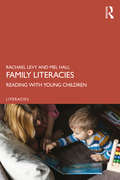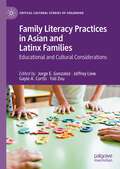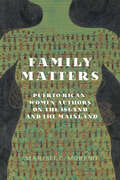- Table View
- List View
Family Communication (2nd Edition)
by Chris Segrin Jeanne Flora<p>Family Communication carefully examines state-of-the-art research and theories of family communication and family relationships. In addition to presenting cutting-edge research, it focuses on classic theories and research findings that have influenced and revolutionized the way scholars conceptualize family interaction. This text offers a thorough and up-to-date presentation of scientific research in family communication for both teachers and students of family communication as well as professionals who work with families. This second edition features: <p> <li>Chapters updated with the latest research, including over 2000 references. <li>Material on understudied family relationships, such as extended family relationships and gay and lesbian relationships <li>Recent research on understudied topics in family communication, including the influence of technology on mate selection, negotiating work and family stress, single parenting, cohabitation, elder abuse, forgiveness in marriage, and the links among communication, culture, and mental health. <li>A revised chapter on parent-child communication, taking a lifespan perspective that helps organize the large body of research in this area. <li>A new chapter devoted to extended family relationships, with special focus on grandparent-grandchild relationships, in-law relationships, and adult children and their parents. <li>An expanded review of family conflict processes, especially in relation to decision making and power. <p> <p>A companion website provides chapter outlines, exam questions, and PowerPoint slides for students and instructors. Undergraduate readers should find the information easy to understand, while advanced readers, such as graduate students and professionals, will find it a useful reference to classic and contemporary research on family communication and relationships.</p>
Family Communication as... Exploring Metaphors for Family Communication
by Jimmie Manning Jordan Allen Katherine J. DenkerAn innovative textbook that presents a novel and compelling examination of family communication studies Family Communication as… Exploring Metaphors for Family Communication presents a series of metaphors through which students explore the nuances and complexities of family interaction. With a unique approach to the foundational theories and real-world practices of family communication, this easily accessible textbook helps students develop a clear understanding of what family communication is and what it can be. Contributions by both prominent and newer scholars theorize about family communication, offer new perspectives, challenge long-held assumptions, and describe original research to provide students with an up-to-date representation of the leading thinking in the field. Each concise chapter focuses on a specific element of family life, engaging key metaphors to stimulate classroom discussion about family in contexts ranging from ritual and embodiment to estrangement and heteronormativity. Throughout the text, students examine family metaphorically—as memory, as social identity, as estrangement, as loss, as resilience, as raced, and more. Presents a metaphorical examination of creating, materializing, contextualizing, politicizing, and complicating family communication Offers an innovative alternative to standard textbooks on the subject Features a thorough introduction advocating for the use of metaphors in teaching Discusses the key topics and theoretical approaches that have defined the field Includes detailed references, additional readings, and an instructor&’s companion website Family Communication as… Exploring Metaphors for Family Communication is an excellent textbook for advanced undergraduate and graduate students in courses including family communication, family studies, interpersonal communication, relational communication, and communication theory. It is also a highly useful resource for scholars in fields such as media studies, psychology, sociology, social work, counseling, and public health.
The Family Communication Sourcebook
by Richard L. West Lynn H TurnerThe Family Communication Sourcebook provides an in-depth examination of contemporary theory and research in the area of family communication. This unique collection offers a state-of-the art approach by pairing conceptual pieces with original studies in the same general topic area. Editors Lynn H. Turner and Richard West present readers with a thoughtful and thorough exploration of the critical issues facing family communication researchers today.
Family Fictions and World Making: Irish and Indian Women’s Writing in the Contemporary Era (Routledge Studies in Comparative Literature)
by Sreya ChatterjeeFamily Fictions and World Making: Irish and Indian Women’s Writing in the Contemporary Era is the first book-length comparative study of family novels from Ireland and India. On the one hand, despite an early as well as late colonial experience, Ireland is often viewed exclusively within a metropolitan British and Europe-centered frame. India, on the other hand, once seen as a model of decolonization for the non-Western world, has witnessed a crisis of democracy in recent years. This book charts the idea of "world making" through the fraught itineraries of the Irish and the Indian family novel. The novels discussed in the book foreground kinship based on ideological rather than biological ties and recast the family as a nucleus of interests across national borders. The book considers the work of critically acclaimed women authors Anne Enright, Elizabeth Bowen, Mahasweta Devi, Jennifer Johnston, Kiran Desai and Molly Keane. These writers are explored as representative voices for the interwar years, the late-modern period, and the globalization era. They not only push back against the male nationalist idiom of the family but also successfully interrogate family fiction as a supposedly private genre. The broad timeframe of Family Fictions and World Making from the interwar period to the globalization era initiates a dialogue between the early and the current debates around core and periphery in postcolonial literature.
Family History Digital Libraries
by William Sims BainbridgeIn the modern era, every family and local community can cultivate its own history, endowing living people with meanings inherited from the people of the past, by means of today’s computer-based information and communication technologies. A new profession is emerging, family historians, serving the wider public by assisting in collection and analysis of fascinating data, by teaching talented amateur historians, and by producing complete narratives. Essential are the skills and technologies required to preserve and connect photos, movies, videos, diaries, memoirs, correspondence, artefacts and even architecture such as homes. Online genealogical services are well established sources of official government records, but usually not for recent decades, and not covering the valuable records of legal, medical, and religious organizations. Information can be shared and interpreted by family members through oral history interviews, social media, and online private archives such as wikis and shared file depositories. This book explores a wide variety of online information sources and achieves coherence by documenting and interpreting the history of a particular extended American family on the basis of 9 decades of movies and videos, 17 decades of photographs, and centuries of documents. Starting now, any family may begin to preserve their current experiences for the historians of the future, but this will require social as well as technical innovations. This book is the essential resource, providing the fundamental principles, effective methods, and fascinating questions required to make our past live again.
The Family Idiot: Gustave Flaubert, 1821-1857, Volume 2 (The Family Idiot #2)
by Jean-Paul SartreSeen by many as the culmination of Sartre's thought and project, and viewed by Sartre himself as an attempt to answer the question, "What, at this point in time, can we know about a man?" this monumental work continues to perplex its fascinated critics and admirers, who have argued about its precise nature. However, as reviews of the first volume in this translation agreed, whatever The Family Idiot may be called—"a dialectic" (Fredric Jameson, New York Times Book Review); "biography, philosophy, or politics? Surely . . . all of these together" (Renee Winegarten, Commentary); "a new form of fiction?" (Victor Brombert, Times Literary Supplement); or simply, "mad, of course" (Julian Barnes, London Review of Books)—its prominent place in intellectual history is indisputable. Volume 2, consisting of the first book of part 2 of the original French work, takes the reader through Flaubert's adolescence well into his evolution as an artist. Sartre's approach to his complex subject, whether jaunty or ponderous, psychoanalytical or political, is captured in all of its rich variety of Carol Cosman's translation.
The Family Idiot: Gustave Flaubert, 1821-1857, Volume 2 (The Family Idiot #2)
by Jean-Paul SartreSeen by many as the culmination of Sartre's thought and project, and viewed by Sartre himself as an attempt to answer the question, "What, at this point in time, can we know about a man?" this monumental work continues to perplex its fascinated critics and admirers, who have argued about its precise nature. However, as reviews of the first volume in this translation agreed, whatever The Family Idiot may be called—"a dialectic" (Fredric Jameson, New York Times Book Review); "biography, philosophy, or politics? Surely . . . all of these together" (Renee Winegarten, Commentary); "a new form of fiction?" (Victor Brombert, Times Literary Supplement); or simply, "mad, of course" (Julian Barnes, London Review of Books)—its prominent place in intellectual history is indisputable. Volume 2, consisting of the first book of part 2 of the original French work, takes the reader through Flaubert's adolescence well into his evolution as an artist. Sartre's approach to his complex subject, whether jaunty or ponderous, psychoanalytical or political, is captured in all of its rich variety of Carol Cosman's translation.
The Family Idiot: Gustave Flaubert, 1821-1857, Volume 3 (The Family Idiot #3)
by Jean-Paul SartreSeen by many as the culmination of Sartre's thought and project, and viewed by Sartre himself as an attempt to answer the question, "What, at this point in time, can we know about a man?" this monumental work continues to perplex its fascinated critics and admirers, who have argued about its precise nature. However, as reviews of the first volume in this translation agreed, whatever The Family Idiot may be called—"a dialectic" (Fredric Jameson, New York Times Book Review); "biography, philosophy, or politics? Surely . . . all of these together" (Renee Winegarten, Commentary); "a new form of fiction?" (Victor Brombert, Times Literary Supplement); or simply, "mad, of course" (Julian Barnes, London Review of Books)—its prominent place in intellectual history is indisputable. Volume 3 consists of "School Years" and "Preneurosis," which are the second and third books of part 2 of the original French work. In vivid detail, Sartre renders Flaubert's secondary-school experiences and relationships: his part in a student rebellion against the faculty, his teenage infatuation with Romantic literature, his friendships and rivalries with his classmates, and the ironies inherent in the schoolboys' bourgeois existence. Sartre then discusses Flaubert's years at law school, where he studied at his father's insistence. This volume also contains Sartre's most sustained analysis of Madame Bovary. Sartre's approach to his complex subject, whether jaunty or judicious, psychoanalytical or political, is captured in all of its rich variety in Carol Cosman's translation.
The Family Idiot: Gustave Flaubert, 1821-1857, Volume 4 (The Family Idiot #4)
by Jean-Paul SartreSeen by many as the culmination of Sartre's thought and project, and viewed by Sartre himself as an attempt to answer the question, "What, at this point in time, can we know about a man?" this monumental work continues to perplex its fascinated critics and admirers, who have argued about its precise nature. However, as reviews of the first volume in this translation agreed, whatever The Family Idiot may be called—"a dialectic" (Fredric Jameson, New York Times Book Review); "biography, philosophy, or politics? Surely . . . all of these together" (Renee Winegarten, Commentary); "a new form of fiction?" (Victor Brombert, Times Literary Supplement); or simply, "mad, of course" (Julian Barnes, London Review of Books)—its prominent place in intellectual history is indisputable. Volume 4 consists of part three, books one and two, of the original French work. This volume, the fourth in a projected five-volume English-language edition, includes Sartre's discussion of the onset of Flaubert's illness, or neurosis, in 1844, and a significant reading of his L'Education sentimentale. Sartre's approach to his complex subject, whether jaunty or judicious, psychoanalytic or political, is captured in all of its rich variety in Carol Cosman's translation.
The Family Idiot: Gustave Flaubert, 1821-1857, Volume 5 (The Family Idiot #5)
by Jean-Paul SartreWith this volume, the University of Chicago Press completes its translation of a work that is indispensable not only to serious readers of Flaubert but to anyone interested in the last major contribution by one of the twentieth century's greatest thinkers. That Sartre's study of Flaubert, The Family Idiot, is a towering achievement in intellectual history has never been disputed. Yet critics have argued about the precise nature of this novel or biography or "criticism-fiction" which is the summation of Sartre's philosophical, social, and literary thought. In the preface, Sartre writes: "The Family Idiot is the sequel to Search for a Method. The subject: what, at this point in time, can we know about a man? It seemed to me that this question could only be answered by studying a specific case." Sartre discusses Flaubert's personal development, his relationship to his family, his decision to become a writer, and the psychosomatic crisis or "conversion" from his father's domination to the freedom of his art. Sartre blends psychoanalysis with a sociological study of the ideology of the period, the crisis in literature, and Flaubert's influence on the future of literature. While Sartre never wrote the final volume he envisioned for this vast project, the existing volumes constitute in themselves a unified work—one that John Sturrock, writing in the Observer, called "a shatteringly fertile, digressive and ruthless interpretation of these few cardinal years in Flaubert's life." "A virtuoso perfomance. . . . For all that this book does to make one reconsider his life, The Family Idiot is less a case study of Flaubert than it is a final installment of Sartre's mythology. . . . The translator, Carol Cosman, has acquitted herself brilliantly."—Frederick Brown, New York Review of Books "A splendid translation by Carol Cosman. . . . Sartre called The Family Idiot a 'true novel,' and it does tell a story and eventually reach a shattering climax. The work can be described most simply as a dialectic, which shifts between two seemingly alternative interpretations of Flaubert's destiny: a psychoanalytic one, centered on his family and on his childhood, and a Marxist one, whose guiding themes are the status of the artist in Flaubert's period and the historical and ideological contradictions faced by his social class, the bourgeoisie."—Fredric Jameson, New York Times Book Review Jean-Paul Sartre (1906-1980) was offered, but declined, the Nobel Prize for literature in 1964. His many works of fiction, drama, and philosophy include the monumental study of Flaubert, The Family Idiot, and The Freud Scenario, both published in translation by the University of Chicago Press.
The Family Idiot: Gustave Flaubert, 1821-1857, Volume 5 (The Family Idiot #5)
by Jean-Paul SartreWith this volume, the University of Chicago Press completes its translation of a work that is indispensable not only to serious readers of Flaubert but to anyone interested in the last major contribution by one of the twentieth century's greatest thinkers. That Sartre's study of Flaubert, The Family Idiot, is a towering achievement in intellectual history has never been disputed. Yet critics have argued about the precise nature of this novel or biography or "criticism-fiction" which is the summation of Sartre's philosophical, social, and literary thought. In the preface, Sartre writes: "The Family Idiot is the sequel to Search for a Method. The subject: what, at this point in time, can we know about a man? It seemed to me that this question could only be answered by studying a specific case." Sartre discusses Flaubert's personal development, his relationship to his family, his decision to become a writer, and the psychosomatic crisis or "conversion" from his father's domination to the freedom of his art. Sartre blends psychoanalysis with a sociological study of the ideology of the period, the crisis in literature, and Flaubert's influence on the future of literature. While Sartre never wrote the final volume he envisioned for this vast project, the existing volumes constitute in themselves a unified work—one that John Sturrock, writing in the Observer, called "a shatteringly fertile, digressive and ruthless interpretation of these few cardinal years in Flaubert's life." "A virtuoso perfomance. . . . For all that this book does to make one reconsider his life, The Family Idiot is less a case study of Flaubert than it is a final installment of Sartre's mythology. . . . The translator, Carol Cosman, has acquitted herself brilliantly."—Frederick Brown, New York Review of Books "A splendid translation by Carol Cosman. . . . Sartre called The Family Idiot a 'true novel,' and it does tell a story and eventually reach a shattering climax. The work can be described most simply as a dialectic, which shifts between two seemingly alternative interpretations of Flaubert's destiny: a psychoanalytic one, centered on his family and on his childhood, and a Marxist one, whose guiding themes are the status of the artist in Flaubert's period and the historical and ideological contradictions faced by his social class, the bourgeoisie."—Fredric Jameson, New York Times Book Review Jean-Paul Sartre (1906-1980) was offered, but declined, the Nobel Prize for literature in 1964. His many works of fiction, drama, and philosophy include the monumental study of Flaubert, The Family Idiot, and The Freud Scenario, both published in translation by the University of Chicago Press.
The Family Idiot: Gustave Flaubert, 1821-1857, Volume 4 (The Family Idiot #4)
by Jean-Paul SartreSeen by many as the culmination of Sartre's thought and project, and viewed by Sartre himself as an attempt to answer the question, "What, at this point in time, can we know about a man?" this monumental work continues to perplex its fascinated critics and admirers, who have argued about its precise nature. However, as reviews of the first volume in this translation agreed, whatever The Family Idiot may be called—"a dialectic" (Fredric Jameson, New York Times Book Review); "biography, philosophy, or politics? Surely . . . all of these together" (Renee Winegarten, Commentary); "a new form of fiction?" (Victor Brombert, Times Literary Supplement); or simply, "mad, of course" (Julian Barnes, London Review of Books)—its prominent place in intellectual history is indisputable. Volume 4 consists of part three, books one and two, of the original French work. This volume, the fourth in a projected five-volume English-language edition, includes Sartre's discussion of the onset of Flaubert's illness, or neurosis, in 1844, and a significant reading of his L'Education sentimentale. Sartre's approach to his complex subject, whether jaunty or judicious, psychoanalytic or political, is captured in all of its rich variety in Carol Cosman's translation.
The Family Idiot: Gustave Flaubert, 1821–1857, An Abridged Edition
by Jean-Paul SartreAn approachable abridgment of Sartre’s important analysis of Flaubert. From 1981 to 1994, the University of Chicago Press published a five-volume translation of Jean-Paul Sartre’s The Family Idiot: Gustave Flaubert, 1821-1857, a sprawling masterwork by one of the greatest intellects of the twentieth century. This new volume delivers a compact abridgment of the original by renowned Sartre scholar, Joseph Catalano. Sartre claimed that his existential approach to psychoanalysis required a new Freud, and in his study of Gustave Flaubert, Sartre becomes that Freud. The work summarizes Sartre’s overarching aim to reveal that human life is a meaningful adventure of freedom. In discussing Flaubert’s work, particularly his classic novel Madame Bovary, Sartre unleashes a fierce critique of modernity as nihilistic and demeaning of human dignity.
The Family Idiot: Gustave Flaubert, 1821–1857, An Abridged Edition
by Jean-Paul SartreAn approachable abridgment of Sartre’s important analysis of Flaubert. From 1981 to 1994, the University of Chicago Press published a five-volume translation of Jean-Paul Sartre’s The Family Idiot: Gustave Flaubert, 1821-1857, a sprawling masterwork by one of the greatest intellects of the twentieth century. This new volume delivers a compact abridgment of the original by renowned Sartre scholar, Joseph Catalano. Sartre claimed that his existential approach to psychoanalysis required a new Freud, and in his study of Gustave Flaubert, Sartre becomes that Freud. The work summarizes Sartre’s overarching aim to reveal that human life is a meaningful adventure of freedom. In discussing Flaubert’s work, particularly his classic novel Madame Bovary, Sartre unleashes a fierce critique of modernity as nihilistic and demeaning of human dignity.
The Family Idiot: Gustave Flaubert, 1821–1857, An Abridged Edition
by Jean-Paul SartreAn approachable abridgment of Sartre’s important analysis of Flaubert. From 1981 to 1994, the University of Chicago Press published a five-volume translation of Jean-Paul Sartre’s The Family Idiot: Gustave Flaubert, 1821-1857, a sprawling masterwork by one of the greatest intellects of the twentieth century. This new volume delivers a compact abridgment of the original by renowned Sartre scholar, Joseph Catalano. Sartre claimed that his existential approach to psychoanalysis required a new Freud, and in his study of Gustave Flaubert, Sartre becomes that Freud. The work summarizes Sartre’s overarching aim to reveal that human life is a meaningful adventure of freedom. In discussing Flaubert’s work, particularly his classic novel Madame Bovary, Sartre unleashes a fierce critique of modernity as nihilistic and demeaning of human dignity.
Family in Children’s and Young Adult Literature (Children's Literature and Culture)
by Eleanor Spencer and Jade Dillon CraigFamily in Children's and Young Adult Literature is a comprehensive study of the family in Anglophone children’s and Young Adult literature from the early nineteenth century to the present day. Written by intellectual leaders in the field from the UK, the Americas, Europe, and Australia, this collection of essays explores the significance of the family and of familial and quasi-familial relationships in texts by a wide range of authors, including the Grimms, Frances Hodgson Burnett, Rudyard Kipling, Enid Blyton, Judy Blume, Jaqueline Wilson, Malorie Blackman, Melvin Burgess, J.K. Rowling, Neil Gaiman, and others. Author-based and critical survey essays explore evolving depictions of LGBTQIA+ and BAME families; migrant and refugee narratives; the popular tropes of the orphan protagonist and the wicked stepmother; sibling and intergenerational familial relationships; fathers and fatherhood; the anthropomorphic animal and surrogate family; and the fractured family in paranormal and dystopian YA literature. The breadth of essays in Family in Children's and Young Adult Literature encourages readers to think beyond the outdated but culturally privileged ‘nuclear family’ and is a vital resource for students, academics, educators, and practitioners.
The Family in English Children's Literature (Children's Literature and Culture)
by Ann AlstonFrom the trials of families experiencing divorce, as in Anne Fine’s Madame Doubtfire, to the childcare problems highlighted in Jacqueline Wilson’s Tracy Beaker, it might seem that the traditional family and the ideals that accompany it have long vanished. However, in The Family in English Children’s Literature, Ann Alston argues that this is far from the case. She suggests that despite the tales of family woe portrayed in children’s literature, the desire for the happy, contented nuclear family remains inherent within the ideological subtexts of children’s literature. Using 1818 as a starting point, Alston investigates families in children’s literature at their most intimate, focusing on how they share their spaces, their ideals of home, and even on what they eat for dinner. What emerges from Alston’s study are not so much the contrasts that exist between periods, but rather the startling similarities of the ideology of family intrinsic to children’s literature. The Family in English Children’s Literature sheds light on who maintains control, who behaves, and how significant children’s literature is in shaping our ideas about what makes a family "good."
Family Language Learning
by Christine JerniganFamily Language Learning is a practical guide designed to support, advise and encourage any parents who are hoping to raise their children bilingually. It is unique in that it focuses on parents who are not native speakers of a foreign language. It gives parents the tools they need to cultivate and nurture their own language skills while giving their children an opportunity to learn another language. The book combines cutting-edge research on language exposure with honest and often humorous stories from personal interviews with families speaking a foreign language at home. By dispelling long-held myths about how language is learned, it provides hope to parents who want to give their children bilingual childhoods, but feel they don't know where to start with learning foreign languages.
Family Language Policies in a Multilingual World: Opportunities, Challenges, and Consequences (ESL & Applied Linguistics Professional Series)
by John Macalister Seyed Hadi MirvahediThrough case studies from around the world, this book illustrates the opportunities and challenges facing families negotiating the issues of language maintenance and language learning in the home. Every family living in a bi/multilingual environment faces the question of what language(s) to speak with their children and must make a decision, consciously or otherwise, about these issues. Exploring links between language policy in the home and wider society in a range of diverse settings, the contributors utilize various research tools, including interviews, questionnaires, observations, and archival document analysis, to explore linguistic ideologies and practices of family members in the home, illuminating how these are shaped by macro-level societal processes.
Family Language Policy: Children’s Perspectives
by Sonia WilsonThis book explores the question of family language policy in multilingual households. Presenting six case studies which focus on the experiences of parents and children in French-English bilingual contexts, the author draws conclusions about the impact of parental language management on the family as a whole which can be applied to transnational families from other linguistic backgrounds. While many parental guides on bilingual childrearing have been published in recent years, little attention has been paid to the possible impact of such language strategies on the experiences and interrelationships of bilingual family members. This book is unique in focusing in depth on the psychology and experiences of the child, and it will be of interest to readers in fields as diverse as sociolinguistics, language policy and planning, sociology of youth and family, and child psychology.
Family Language Policy in the Polish Diaspora: A Focus on Australia (Routledge Studies in Sociolinguistics)
by Piotr RomanowskiThis book explores language practices, beliefs and management across a group of Polish immigrant families in Australia, drawing on these case studies as a lens through which to unpack dynamics of Family Language Policy (FLP) and their implications for future research on FLP. The volume begins by outlining the historical context of Polish immigration in Australia, charting two key waves of Polish migration in the 20th century and the subsequent unfolding of issues around language and culture maintenance in these families. This discussion paves the way for exploring key themes of language socialization, language ideologies and heritage language maintenance and the affordances of FLP research in elucidating these dynamics at work in the lived experiences of a group of Polish immigrant families in Melbourne. The book highlights the importance of a triangulated approach, integrating qualitative and quantitative methods, in offering nuanced insights into parental approaches and children’s experiences of a bilingual upbringing and the wider impact of FLP on transnational families. Opening up avenues for future research on Family Language Policy and a better understanding of the language practices of specific communities in a globalised world, this book will be of interest to scholars in multilingualism, sociolinguistics and applied linguistics.
Family Literacies: Reading with Young Children (Literacies)
by Rachael Levy Mel HallFamily Literacies demonstrates, through reference to empirical research, how shared reading practices operate in a wide range of families, with a view to supporting families in reading with their pre-school children. At the heart of this book, written by two highly experienced experts in the field, is a fascinating project that captured diverse voices, and experiences by parents, children and other family members. Rachael Levy and Mel Hall deploy a rich and distinctive theoretical framework, drawing on insights from literacy studies, education and sociology. Family Literacies presents an account of shared reading practices in homes, focusing attention on what motivates parents to read with their children as well as revealing what parents may need if they are to begin and sustain shared reading activity. The authors show the many ways in which reading is centrally embedded in many aspects of family life, arguing that this has particular implications for children as they start school. Situated within a socio-cultural discourse, this book explains why it is important to understand how and why shared reading takes place in homes so that all families can be supported in reading with their children. Family Literacies is essential reading for all those who are studying and researching literacy practices, especially those involving young children. The book will also be of value to students, practitioners and researchers in education and applied linguistics who are working with families and have an interest in the study of family practices. The authors’ findings have major implications for how parents can be encouraged to develop positive reading relationships with their children.
Family Literacy Practices in Asian and Latinx Families: Educational and Cultural Considerations (Critical Cultural Studies of Childhood)
by Jorge E. Gonzalez Jeffrey Liew Gayle A. Curtis Yali ZouThis book focuses on the literacy beliefs and practices of parents and children from Asian and Latinx heritage backgrounds. In the US, children from Asian and Latinx immigrant backgrounds represent the largest population of dual language learners in schools. While existing research has paid significant attention to the roles of parenting and the home literacy environment on children's literacy development, relatively little attention has been allocated to immigrant families. Chapters aim to meet the need in the field to understand the roles of culture and immigrant experiences on children's literacy learning and development, including immigrant families' home environments and parents' involvement in literacy-related activities in both English and the parents' native language. As Hispanic/Latinx and Asian American populations grow in the US, this book answers an urgent call for school systems and child and family professionals to be aware of issues in this area and how to address them in culturally responsive ways.
Family Matters: Puerto Rican Women Authors on the Island and the Mainland (New World Studies)
by Marisel C. MorenoAdopting a comparative and multidisciplinary approach to Puerto Rican literature, Marisel Moreno juxtaposes narratives by insular and U.S. Puerto Rican women authors in order to examine their convergences and divergences. By showing how these writers use the trope of family to question the tenets of racial and social harmony, an idealized past, and patriarchal authority that sustain the foundational myth of la gran familia, she argues that this metaphor constitutes an overlooked literary contact zone between narratives from both sides. Moreno proposes the recognition of a "transinsular" corpus to reflect the increasingly transnational character of the Puerto Rican population and addresses the need to broaden the literary canon in order to include the diaspora. Drawing on the fields of historiography, cultural studies, and gender studies, the author defies the tendency to examine these literary bodies independently of one another and therefore aims to present a more nuanced and holistic vision of this literature.
